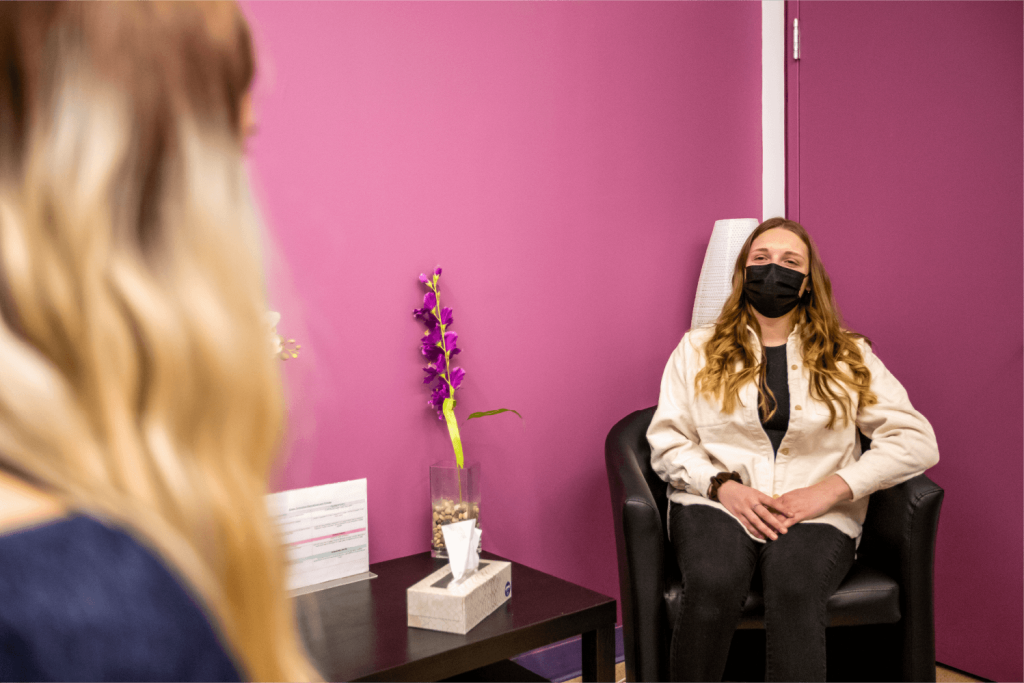Peer Help Centre
*Notice*
We are now open for in-person and online services starting November 2022. Our hours are 10am-4pm Monday to Friday. Services offered include Active Listening sessions, Tutor Help website and online chat (10:30-4pm).
Are you feeling overwhelmed, stressed, lonely or just want someone to vent to?
- Active Listening session booking: entraide-peerhelp.youcanbook.me
- Peer Support Phone Line: 613-783-1380 ext. 153 and 613-562-5800 ext. 8575
- This is different from the PHC reception/general inquiry line which is 613-783-1380 ext. 151
- Peer Support Chat: Click on the purple icon on the bottom left corner to chat with a trained volunteer.

Peer Help Tutor - the Tutor Web App
Looking for a tutor to help you with a specific uOttawa course or would you like to register as a Peer Help Tutor? Click the button below to sign-up for an account today.
Visit the link below for more information about the Peer Help Tutor service.
*note: this is a paid service
We are here for you if you need support.
The Peer Help Centre is a judgment-free, confidential, and empathetic environment!
All Active Listening sessions are confidential within the Centre. Please note for safety reasons, the Peer Support Chat is NOT anonymous, however 100% confidential within the Centre.
Is someone you know facing a mental health crisis? Here’s what you can do to support them. www.seuo-uosu.com/peer-help-mental-health-support/
About Us
Mandate
The Peer Help Centre operates as a peer support service and resource centre. The Centre’s mandate is to provide the student community with academic, personal, and social support through resource distribution and short-term peer consultation. The Peer Help Centre services include: tutoring services, Active Listening sessions that occur in person or via the Peer Support Phone Line and Support Chat, the Mentoring for Youth Program, Peer Editing, and Presentation Critiques. The Centre’s primary goal has always been to offer students at the University of Ottawa a judgment-free, confidential, and empathetic environment.
The Seven Services Offered by the Peer Help Centre
The Mentoring for Youth Program is a program where a University of Ottawa student is matched with a high school student in a mentorship. During this mentorship the Peer Mentor volunteers provide academic, emotional and social support.
Our Team

Eyala Manga
Peer Help Coordinator
peerhelp-coord@seuo-uosu.com

Shaeta Ahmed
Peer Support Supervisor
peerhelp-support@seuo-uosu.com

Nazeeha Jafri
Mentoring for Youth Supervisor
peerhelp-mentor@seuo-uosu.com

Massika Djarmouni
Marketing and Events Supervisor
peerhelp-marketing@seuo-uosu.com
Mental Health Support
The Peer Help Centre offers students Active Listening sessions during office hours that are confidential, where a Peer Helper volunteer can listen empathetically and without judgment, to validate the person’s thoughts and feelings. Every Peer Helper volunteer is trained in Active Listening and Communication, Empathic Assertiveness, and safeTALK by the Distress Centre of Ottawa and Region, and/or LivingWorks Education.
The Peer Support Phone Line is an Active Listening information line and resource/referral service run for students by trained Peer Support Coach volunteers. Whether a student is feeling lonely, stressed, or simply wants someone to talk to, the Peer Support Coach volunteers offer a confidential, accessible form of immediate short-term support. The Phone Line is available during office hours. You can call the Peer Support Phone Line at 613-783-1380 ext. 155.
The Peer Support Chat is a new initiative to the Peer Help Centre launched in February 2020. The Peer Help Centre implemented an Active Listening Peer Support Chat for the University of Ottawa community so that students who sought help could immediately reach someone through a more accessible form of communication. The Peer Support Chat is available during office hours and all the Peer Support Coach volunteers are trained in Active Listening and Communication, Empathic Assertiveness, and ASIST by the Distress Centre of Ottawa and Region, and/or LivingWorks Education. Click on the purple icon on the bottom left corner to chat with a trained volunteer.
If someone you know is facing a mental health crisis, here’s what you can do to support them.
The first step is to determine if they are having a crisis or non-immediate crisis situation.
How can I know if someone is having a crisis or a non-crisis situation?
Crisis Situations Examples
- Actively suicidal students (who claim they have a plan to commit immediately);
- Actively self-harming students; and
- Students who are distressed, need immediate attention (were sexually harassed, assaulted, raped, are actively being abused, intimate partner violence or violence of any kind).
Non-Crisis Situations Examples
- Students with suicidal ideation (have been thinking about suicide, have no plans to commit);
- Students who are thinking of self-harming;
- Students who disclose they want to seek mental health support (depression, anxiety, situational); and
- Students who have been harassed, assaulted, or abused in the past who are not in immediate danger, but would like to disclose their experiences to a professional and seek help.
Now that you know the difference between crisis and non-immediate crisis situations. The following are the necessary procedures to take:
Crisis Situation
When there’s a crisis situation there are different procedures depending on the situation and/or the location of the person in crisis.
- On-Campus Procedures
- If a student is on-campus and they are facing a mental health crisis:
- The student should be offered to be taken to the uOttawa walk-in clinic located in 100 Marie-Curie on the 1st floor; and
- If the student does not want to go to the uOttawa walk-in clinic. The Protection Services could be contacted for emergencies at 613-562-5411. (Please note that the University has 20 panic buttons around the campus that could be used for emergencies).
- If a student is on-campus and they are facing a mental health crisis:
- Off-Campus Procedures
- If a student is off-campus and they are facing a mental health crisis:
- Dial 9-1-1; and
- The mental health Crisis Line could also be reached at 613-722-6914 (1-866-996-0991 outside of Ottawa).
- If a student is off-campus and they are facing a mental health crisis:
Non-Crisis Situation
When there’s a non-crisis situation there are different procedures depending on the situation and/or the location of the person.
- On-Campus and Off-Campus Procedures
- If a student is on-campus and they are in a non-crisis situation:
- Students should be offered on-campus and off-campus resources including distress lines.
- The Peer Help Centre’s Active Listening Services;
- SASS Counselling and Coaching (100 Marie-Curie on the 4th floor);
- Good2Talk Line or Chat (bilingual): 1-866-925-5454 or text ‘’GOOD2TALKON’’ to 686868;
- Distress Centre Line (Bilingual): 613-238-3311;
- Tel-Aide Outaouais (French only):
- Gatineau Helpline: 819-775-3223
- Ottawa Helpline: 613-741-6433
- Outside Outaouais Helpline: 1-800-567-9699; and
- Any other resources that’s related to their situation.
- Students should be offered on-campus and off-campus resources including distress lines.
- If a student is on-campus and they are in a non-crisis situation:
What is Active Listening, Why is it Important and How is it Different from Counselling?
Active Listening helps the person feel listened, understood and cared about in a non-judgmental environment. It aids in self-acceptance and aims through warmth, validation and encouragement. Lack of mental health support, such as Active Listening services, can cause a person’s mental health concerns to escalate to worse and make it harder to speak or share their feelings. When it comes to mental health support, listening is helping because the listener can identify and pick up on non-verbal cues or signs early on a person’s mental health.
Active listening sessions at the Peer Help Centre differ from counselling services. It is offered by peers who may seem easier to approach and who can better adapt to the situation of another peer. As students, volunteers are not certified as counsellors; they are trained not to advise what actions to take, but to listen, and to validate a peer that seeks help and wishes to confide in someone.
The Peer Help Centre offers Active Listening sessions through various platforms: Appointments or Walk-in (In-Person), Peer Support Chat, and Peer Support Phone Line.
Crisis Line (Bilingual)
- Website: crisisline.ca
- Within Ottawa 24/7 Crisis Line: 613-722-6914
- Outside of Ottawa 24/7 Crisis Line: 1-866-996-0991
Good2Talk (Bilingual)
- Website: good2talk.ca
- 24/7 Helpline: 1-866-925-5454
- Crisis Text Line: GOOD2TALKON (or ALLOJECOUTEON in French) to 686868
Distress Centre of Ottawa and Region (Bilingual)
- Website: dcottawa.on.ca
- Tel: 613-238-1089
- 24/7 Distress Line: 613-238-3311
- 24/7 Crisis Line: 613-722-6914 or 1-866-996-0991
Tel-Aide Outaouais (French Only)
- Website: telaideoutaouais.ca
- Gatineau Helpline: 819-775-3223
- Ottawa Helpline: 613-741-6433
- Outside Outaouais Helpline: 1-800-567-9699
TAO (Therapy Assistance Online) (Bilingual)
An online platform of tools and interactive modules that can help you manage the many stressors that come with university life and can help you bounce back from challenging times. This service is available for free to anyone with a uOttawa email account, whether you’re a student or not. Programs available: Calming Your Worry, Let Go and Be Well, Interpersonal, Relationships and Communication, Leave Your Blues Behind, and Improving your Mood. You can anonymously complete a self-screening assessment that will ask you a few questions about common problems and then provide you with some feedback for the next steps you can take.
Wellness Resources (Bilingual)
Counselling Services provides you with informational resources and online tools (books, videos, phone applications, worksheets, etc.) to help you develop good mental health literacy and support you in your academic and personal journey. Resources include; academic life, mental health, social life, and self-care.
Student Statistics
Statistics of most common issues’ students came in for at the Peer Help Centre in the academic year of 2019-2020.
Peer Help Tutor
Need a tutor for a specific uOttawa course or want to become a Peer Help tutor? Click here to access the Tutor Web App or visit www.peerhelptutor.com.
The Peer Help Tutor service is an initiative created by 2019 uOttawa alumni student, Mira Ghossein. Launched in November 2020, the tutoring service allows students to match with registered tutors for specific University of Ottawa courses at an affordable price.
All tutors must have at least a B+ as a final mark in the course(s) they are intending to tutor. Furthermore, in order to maintain affordability of tutorship services, Masters and PhD students are to charge no more than $30/hour. All other tutors are not permitted to charge more than $20/hour.
Self-Help Tools
A table displaying a helpful tool to better understand the 11 undergraduate academic paths at the University of Ottawa.
Website: www.uottawa.ca/understanding-your-undergraduate-program/
They have various documents, tools and instructions for academic integrity, writing process, structure of paper, types of paper and grammar.
Website: sass.uottawa.ca/en/writing/resources
Study Skills Hub is designed to help students master the skills needed to succeed in university. They’ve put together a series of instructional articles online, to help develop students’ skills whenever and wherever they find most convenient. This allows them to improve their effectiveness, and to address study issues such as procrastination, perfectionism, stress management, motivation, exam preparation, memorizing, time management, teamwork and taking notes.
Website: sass.uottawa.ca/en/mentoring/resources
Email: asupp@uottawa.ca
Tel: 613-562-5800 ext. 3820
Get Involved
Volunteer Descriptions
Peer Helpers, known as office volunteers, are the core of the Peer Help Centre’s services during regular office hours. They offer students a confidential in-person Active Listening session where they listen empathically and without judgement, to validate the person’s thoughts and feelings. Among other tasks, Peer Helpers assist students by providing information and support, oriented in resources for on and off-campus services, and volunteer at the reception. They also provide students with Peer Editing and Presentation Critiques.
- Training Involved: Peer Helpers are trained in Active Listening and Communication, Empathic Assertiveness, and safeTALK provided by the Distress Centre of Ottawa and Region, and/or LivingWorks Education. As well, they are trained in resources for on and off-campus services, and reception.
- Time Commitment: Peer Helpers have two 1.5 hour shifts a week at the Centre.
Peer Help Assistants are responsible for supporting staff members with their mandates regarding undergraduates’ volunteers and to complete tasks for the Centre assigned by the Coordinator. They will consult volunteers after each Active Listening sessions to evaluate their performance, act as a liaison to partners of the Centre, and help with the operation of the Mentoring for Youth Program.
- Training Involved: Peer Assistants are trained in Active Listening and Communication, Empathic Assertiveness and ASIST provided by the Distress Centre of Ottawa and Region, and/or LivingWorks Education. As well, they are trained in resources for on and off-campus services, and the Peer Support Chat platform.
- Time Commitment: Hours per week: 10-15 hours
- Reporting to: Peer Help Coordinator
Peer Support Coaches volunteer during regular office hours for the Peer Support Phone Line and the Peer Support Chat services. They offer students confidential Active Listening sessions where they listen empathically and without judgement, to validate the person’s thoughts and feelings. Among other tasks, Peer Support Coaches assist students by providing information and support, and oriented in resources for on and off-campus services.
- Training Involved: Peer Support Coaches are trained in Active Listening and Communication, Empathic Assertiveness and ASIST provided by the Distress Centre of Ottawa and Region, and/or LivingWorks Education. As well, they are trained in resources for on and off-campus services, and the Peer Support Chat platform.
- Time Commitment: Peer Support Coaches have one 3 hours shift a week at the Centre.
Peer Mentors are responsible for dedicating their time to establishing a supportive mentoring relationship with a high school student and meeting all program requirements. A Peer Mentor serves as a role model for their student and provides friendly guidance and support. Some of the mentoring goals include strategizing for academic success, promoting postsecondary education, and assisting with social and emotional development.
- Training Involved: Peer Mentors are trained in Active Listening and Communication, and Empathic Assertiveness by the Distress Centre of Ottawa and Region. They are also trained in safeTALK and two mentoring training workshops provided by SASS Mentoring Centre. As well, they are trained in resources. A Vulnerable Sector Check must be done in order to be a Peer Mentor.
- Time Commitment: The Peer Mentor will be responsible for meeting with their mentee 3 times a month for a duration of 1.5-2 hours per meeting. A social event will happen once a month where a Peer Mentor and a mentee will be expected to attend, these events can be up to 2-3 hours long. A bi-weekly meeting with the Mentoring for Youth Supervisor will be 30 minutes long.
Peer Help Ambassadors are responsible for dedicating their time to: promoting all the services provided by the Peer Help Centre. The Peer Help Ambassador will be trained to develop the necessary soft skills to communicate efficiently with students on a friendly, respectful and social way in order to approach students on campus to distribute flyers and explain what are the services we offer.
- Training Involved: The Peer Help Ambassador will undergo training provided by the Centre to fully understand all the different services and resources provided by the centre and to develop necessary soft skills.
- Time Commitment:
The Peer Help Ambassador will be responsible for doing rounds in campus 3 times a month for a duration of 1.5-2 hours per round. A social event will happen once a month where Peer Help Ambassadors are expected to attend, these events can be up to 2-3 hours long. A bi-weekly meeting will be held with the Marketing and Event supervisor that takes about 30 minutes long.
The Marketing Assistant is responsible for dedicating their time to assist the events supervisor with ongoing events and marketing campaigns by collecting audience feedback, creating content, update spreadsheets.
- Training Involved: The Marketing Assistant will undergo training provided by the Centre to fully understand all the different services and resources provided.
- Time Commitment: The Marketing Assistant will have to work 2 shifts of 2-3 Hours each every week. As well as a bi-weekly meeting will be held with the Marketing and Event supervisor that takes around 30 minutes long.
Contact Us
Peer Help Centre – For general information
Email: peerhelp@seuo-uosu.com
Reception: 613-783-1380 ext. 151
Eyala Manga – Peer Help Coordinator
Email: peerhelp-coord@seuo-uosu.com
Tel: 613-783-1380 ext. 718
Shaeta Ahme – Peer Support Supervisor
Email: peerhelp-support@seuo-uosu.com
Nazeeha Jafr – Mentoring for Youth Supervisor
Email: peerhelp-mentor@seuo-uosu.com
Massika Djarmouni – Marketing and Events Supervisor
Email: peerhelp-marketing@seuo-uosu.com
Office Hours
Monday: 10:00 – 16:00
Tuesday: 10:00 – 16:00
Wednesday: 10:00 – 16:00
Thursday: 10:00 – 16:00
Friday: 10:00 – 16:00
Saturday: Closed
Sunday: Closed
Office Location
Frequently Asked Questions
Opportunities
We are looking for volunteers and students can find all the information under the “Get involved” section.
Visit UOSU’s job opportunities for future opportunities at the Peer Help Centre or any other positions available within UOSU.
The Peer Help Centre does not offer any kind of training outside the Centre.
Visit www.peerhelptutor.com to register as a tutor.
Services
All services are free of charge aside from the tutoring services.
No, the tutoring services are not free of charge.
In order to maintain affordability of tutorship services, Masters and PhD students are to charge no more than $30/hour. All other tutors are not permitted to charge more than $20/hour.
No, the Peer Help Centre does not provide counselling services. However, Active Listening sessions are available to students.
General Inquiry
Yes, all the services are offered to any student registered at the University of Ottawa.
Active listening sessions at the Peer Help Centre differ from counselling services. It is offered by fellow peers who may seem less intimidating to approach and who may relate better to a fellow student’s situation than professionals. As students, volunteers are not certified as counsellors; they are trained not to advise what actions to take, but to listen, and to validate a peer that seeks help and wishes to confide in someone.
Registered students at the University of Ottawa and/or alumni students.